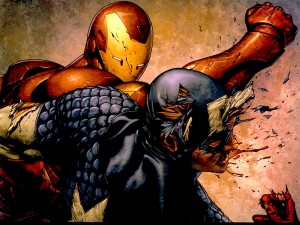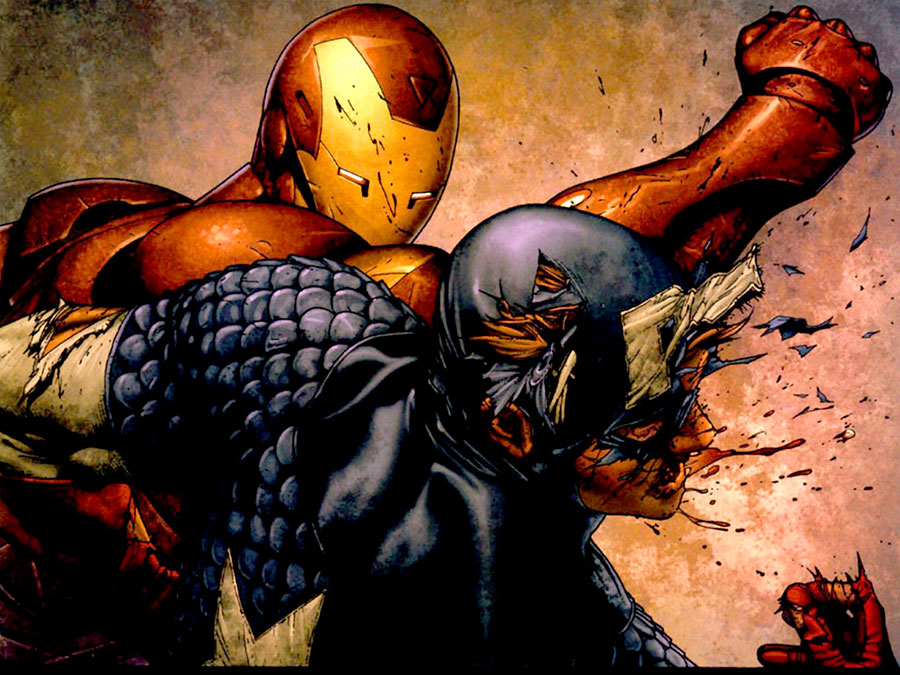Marvel Studios gearing up for a superhero Civil War
The Avengers won’t assemble again until this May, but Marvel is already busy thinking of ways to tear them apart.
The news that Iron Man (Robert Downey Jr.) will co-star alongside Chris Evans’ Cap in Anthony and Joe Russo’s upcoming Captain America 3 has prompted ardent speculation that Disney and Marvel are gearing up for a big-screen adaptation of Civil War, the massive, politically-charged crossover event that shook the foundations of the Marvel universe to its four-color core when the seven-issue limited series was released in the summer of 2006.

Team divided · An argument between Iron Man (Robert Downey Jr.) and Captain America (Chris Evans) over the merits of Superhuman Registration results in a superhero schism in Marvel’s epic crossover storyline Civil War. – Photo courtesy of Marvel Comics
The story, written by Kick-Ass and Wanted creator Mark Millar, follows the disbanding of the Avengers after a bitter falling out between Cap and Iron Man over the latter’s support of the controversial Superhuman Registration Act, a piece of legislation requiring all costumed adventurers operating in the United States to reveal their true identities and serve at the whim of the U.S. government, either as salaried S.H.I.E.L.D. employees or glorified police officers. The law, a thinly veiled allegory for the Patriot Act and the ease of its passage in the fear-swamped aftermath of 9/11, is the direct result of public sentiment turning against superheroes in the wake of a tragic confrontation between an upstart, fame-mongering vigilante group known as the New Warriors — they even have their own Big Brother-style reality show — and a gang of super-villains that spilled over into the streets, leading to the deaths of over 600 civilians, 60 of them children.
The issue sharply divides the superhero community. Iron Man’s pro-registration camp boasts Reed Richards, the elastic-limbed leader of the Fantastic Four, and Hank Pym, better known as the original Ant-Man, while Cap’s anti-registration side includes his loyal sidekick-turned-partner Falcon, skillfully played by Anthony Mackie in last spring’s The Winter Soldier, and Luke Cage, a black hero who receives scorn from the pro-registration crowd after comparing the law to slavery. When diplomacy inevitably fails, the two sides come to blows, resulting in several major shake-ups in Marvel’s status quo, with continuity aftershocks that can still be felt nearly a decade later, including the political ascendance of Norman Osborn, a.k.a. the Green Goblin, who uses the in-fighting as an excuse to consolidate power in ways that would make Dick Cheney’s pacemaker skip a beat.
An ideological clash between two of Marvel’s most popular characters might sound like money in the bank, but there are more than a few obstacles standing in the way of a fully-realized Civil War movie. First and foremost, it seems way too early for this particular storyline. The Avengers have only been a team for around three years. Is it really time to break them up already? Will Captain America 3 tell the whole story, or will the bulk of the drama be reserved for a later date, maybe just in time for The Avengers 3 in 2018?
Then there’s the issue of the Superhuman Registration Act itself. With the exception of some of the characters on Agents of S.H.I.E.L.D., very few heroes in the Marvel Cinematic Universe are dependent on hidden identities. If you take away the right-to-secrecy underpinnings, the social commentary behind the law and the debate surrounding it loses a lot of its satiric bite.
I mean, think about it: Thor (Chris Hemsworth) is always the first to inform people he’s an Asgardian prince. Black Widow (Scarlett Johansson) and Hawkeye (Jeremy Renner) are already government operatives, so the law wouldn’t affect them. The name Steve Rogers is plastered all over a Captain America Smithsonian exhibit in The Winter Soldier. Any New Yorker with a smart phone could have caught Bruce Banner (Mark Ruffalo) hulking out during the climax of The Avengers. Hell, Tony Stark couldn’t even make it through one movie without outing himself as Iron Man — at a crowded press conference, no less — and Iron Man 3 had the goateed technocrat giving out his home address to the media as part of an ill-advised attempt to draw the Mandarin out of hiding. All these observations add up to one inescapable conclusion: none of these guys seem overly concerned about privacy, so why would they suddenly be willing to fight and die over it?
There’s also Millar’s borderline-villainous characterization of Iron Man to consider. As the story unfolds, Stark becomes increasingly fanatical when it comes to enforcing the law, even going so far as to send his fellow superheroes to a specially-designed prison in the Negative Zone — a parallel universe made up entirely of antimatter — if they refuse to register. Even though Downey has expressed an interest in exploring Stark’s dark side in the past, specifically the alcoholism-centric “Demon in a Bottle” storyline, it’s difficult to imagine Marvel allowing their flagship character to be remolded into a jackbooted autocrat. Besides, Downey’s Stark doesn’t seem like he trusts the government enough to become its willing puppet. In The Avengers, he was on the S.H.I.E.L.D. helicarrier less than 10 minutes before he started hacking their system to learn more about their weapons programs.
The biggest challenge facing a potential Civil War movie is the ever-present specter of usage rights. Many of the story’s most pivotal players, including Stark’s ally Reed Richards and the ostensibly neutral X-Men, are not owned by Marvel. The rights to both the X-Men and the Fantastic Four are currently held by Fox, and Marvel has recently taken steps to avoid giving their longtime rival any help in the creative department, forbidding their writers to create any new X-Men mutants and cancelling the beloved Fantastic Four comic, despite the fact that Marvel’s “First Family” is about to celebrate its 75th anniversary.
The character whose absence would be perhaps the most glaring and deeply felt is Spider-Man, who serves as the audience surrogate for much of Civil War. His involvement in the Superhuman Registration Act feud begins when Stark convinces the web-head to reveal himself as Peter Parker on live TV, which strikes an important early blow against the anti-registration movement. When he finds out about the Negative Zone prison, however, Spidey realizes he’s chosen the wrong side and attempts to reach out to Cap and his underground resistance fighters, setting the stage for a truly grand finale. Simply put: To remove Spider-Man from Civil War is to rob Millar’s narrative of its moral center.
All is not lost, however. There have been rumblings, vague but persistent, that Sony Pictures, the current rights holder to Spider-Man on film, is meeting with Disney and Marvel to discuss the possibility of allowing the wall-crawler to scuttle into the Marvel Cinematic Universe for a no-doubt sizable movie-by-movie fee, specifically within the forthcoming Phase Three docket of films, which is set to include, by sheer coincidence, both Captain America 3 and The Avengers 3.
If Sony is truly interested in sharing Spidey for a storyline this epic, it’s fair to say the fan response would be nothing short of rapturous. In fact, if all goes well, we could very well be looking at the first Civil War to actually bring people together.
Landon McDonald is a graduate student studying public relations. His column, “Screen Break,” runs Fridays.

